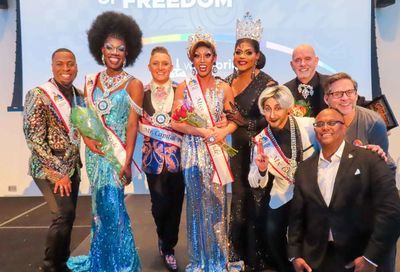U.S. Supreme Court declines appeal from Washington florist who refused to serve gay couple
Refusal to hear case means lower court decision finding Arlene's Flowers guilty of violating the Washington Law Against Discrimination stands.
By John Riley on July 2, 2021 @JRileyMW

On Friday, the U.S. Supreme Court refused to hear a case involving Washington State florist who was accused of violating the state’s nondiscrimination law when she refused to provide flowers for a same-sex couple’s wedding.
The high court refused to grant certiorari, which would allow lawyers for the flower shop owner to argue that anti-discrimination laws prohibiting discrimination based on sexual orientation or gender identity violate the First Amendment rights of those with sincerely held beliefs opposing homosexuality or same-sex marriage. Notably, Justices Thomas, Alito, and Gorsuch indicated they would have voted to hear the case
By passing on the issue, the high court allows the lower court’s decision, in favor of the gay couple denied service, to stand.
Robert Ingersoll and Curt Freed brought the case after being denied flowers for their wedding in 2013, alleging that the proprietor of the Richland-based flower shop Arlene’s Flowers, Barronelle Stutzman, violated the Washington Law Against Discrimination, which prohibits discrimination based on a number of characteristics, including sexual orientation.
Stutzman has claimed that her religious beliefs opposing homosexuality and same-sex marriage prohibit her from providing goods or services that could be used in a same-sex wedding. After first refusing to settle the case for $2,000, and then losing at the district court level, she and her lawyers appealed the case to the Washington State Supreme Court, which unanimously found that the florist had violated the Washington Law Against Discrimination, and that providing equal service to all customers did not violate her constitutional rights.
Stutzman’s lawyers then appealed the case to the U.S. Supreme Court, which remanded the case back to the Washington State Supreme Court for reconsideration, in case the decision might have been clouded by anti-religious bias. The high court had previously found, in a similar case, known as the Masterpiece Cakeshop case, that the Colorado Civil Rights Commission may have acted in a prejudicial manner against a Colorado baker who was found to have violated the state’s nondiscrimination law when he refused to provide a wedding cake for same-sex wedding.
But in 2019, the Washington State Supreme Court stood by its earlier decision, finding, once again, that Stutzman had violated the law and finding no evidence of any animus toward religion in general nor towards Stutzman’s personal beliefs. The court also rejected Stutzman’s claims that the law violates her First Amendment Rights and that lawmakers should carve out a religious exemption in the law.
See also: Washington florist who refused service to gays appeals to U.S. Supreme Court
“Stutzman contends that there is no reason to enforce the WLAD when, as she puts it, ‘[N]o access problem exists.’ We emphatically reject this argument,” the court wrote at the time. “We agree with Ingersoll and Freed that ‘[t]his case is no more about access to flowers than civil rights cases in the 1960s were about access to sandwiches.’
“As every other court to address the question has concluded, public accommodations laws do not simply guarantee access to goods or services. Instead, they serve a broader societal purpose: eradicating barriers to the equal treatment of all citizens in the commercial marketplace,” the decision reads. “Were we to carve out a patchwork of exceptions for ostensibly justified discrimination, that purpose would be fatally undermined.”
Stutzman’s lawyers then appealed the case back up to the Supreme Court once more, resulting in Friday’s decision.

“Today, the Supreme Court confirmed that LBGTQ people should receive equal service when they walk into a store,” Ria Tabacco Mar, a lawyer with the American Civil Liberties Union, which represented Ingersoll and Freed, said in a statement. “Planning a wedding was a joyful time for Rob and Curt until they were refused service at their local flower shop.
“No one should walk into a store and have to wonder whether they will be turned away because of who they are. Preventing that kind of humiliation and hurt is exactly why we have nondiscrimination laws,” Mar added. “Yet 60 percent of states still don’t have express protections for LGBTQ people like the kind in Washington State. Our work isn’t over yet.”
“After Curt and I were turned away from our local flower shop, we cancelled the plans for our dream wedding because we were afraid it would happen again,” Ingersoll added in his own statement. “We had a small ceremony at home instead. We hope this decision sends a message to other LGBTQ people that no one should have to experience the hurt that we did.”
The Human Rights Campaign praised the high court’s decision not to hear the case, and said the decision opens the door for Congress to cement legal protections for LGBTQ people by passing the Equality Act, a landmark law that, if passed, would prohibit discrimination based on a person’s sexual orientation or gender identity in various facets of life.
“By denying certiorari in Ingersoll & Freed v. Arlene’s Flowers, Inc., the Supreme Court has once again said that critical nondiscrimination laws protecting LGBTQ people are legally enforceable and has set a strong and definitive precedent,” Alphonso David, the president of the Human Rights Campaign, said in a statement. “Now, we need these protections for the LGBTQ community, and all people, across the country, and in every walk of life. … The Court has validated nondiscrimination protections, now Congress must follow suit.”
See also:
13-year-old girl sues Florida over bill barring transgender athletes from female sports teams
Caitlyn Jenner wants to move homeless people to “big, open fields”
Transgender woman sues hotel chain for firing her for wearing women’s clothes to work
Disney Boldly Refuses to Cut Ties with HRC
Despite conservative pressure, Disney investors overwhelmingly rejected a proposal to stop participating in HRC's equality ratings survey.
By John Riley on March 23, 2025 @JRileyMW
The Walt Disney Company overwhelmingly rejected a proposal to cut ties with the Human Rights Campaign, the nation's largest LGBTQ advocacy organization.
The proposal, submitted to Disney's shareholders by the right-wing National Center for Public Policy Research's Free Enterprise Project, demanded that the company "cease" its participation in HRC's Corporate Equality Index (CEI).
The CEI rates companies on how LGBTQ-friendly or -affirming their employment or employee benefits policies are.
NCPPR's proposal argued that Disney's involvement with the CEI has alienated conservatives, hurting the company's brand by aligning itself with the LGBTQ community, having pro-LGBTQ workplace policies, and damaging the company's stock price.
Cincinnati Pride Cuts Ties With Several Corporate Sponsors
The LGBTQ organization wants to partner only with corporations that demonstrate regular support for the LGBTQ community and respect for DEI.
By John Riley on March 25, 2025 @JRileyMW
Cincinnati Pride announced it will cut ties with several corporate sponsors, sacrificing tens of thousands of dollars, in response to the companies' decisions to eliminate diversity, equity, and inclusion (DEI) policies and initiatives.
The organization acknowledged that it would be a struggle to replace the funding for its annual Pride parade. But it has also said it is essential to stand by its values, which include respect for the history and diverse culture of the LGBTQ community.
Cincinnati Pride says it doesn't want to work with corporate sponsors that are viewed as hostile to those values and would rather work with companies that have demonstrated a genuine, ongoing commitment to LGBTQ causes throughout the calendar year, according to Cincinnati NBC affiliate WLWT.
Supreme Court Could Pave Way for Return of Conversion Therapy
The Supreme Court will hear a challenge to Colorado's conversion therapy ban and could strike down similar bans across the nation.
By John Riley on March 11, 2025 @JRileyMW
The U.S. Supreme Court has agreed to take up a challenge to a Colorado law prohibiting mental health therapists from subjecting LGBTQ youth to conversion therapy.
The court will hear the case during its next term, which begins in October and runs through June 2026.
Conversion therapy is a practice intended to change a person's sexual orientation or gender identity to align with heterosexual or cisgender norms. Most mainstream medical organizations have largely discredited it as ineffective and potentially even harmful.
Yet, many social conservatives insist that people who hold religious beliefs opposing homosexuality should be allowed to enroll their children, or, in the case of adults, themselves, in the practice.
Support Metro Weekly’s Journalism
These are challenging times for news organizations. And yet it’s crucial we stay active and provide vital resources and information to both our local readers and the world. So won’t you please take a moment and consider supporting Metro Weekly with a membership? For as little as $5 a month, you can help ensure Metro Weekly magazine and MetroWeekly.com remain free, viable resources as we provide the best, most diverse, culturally-resonant LGBTQ coverage in both the D.C. region and around the world. Memberships come with exclusive perks and discounts, your own personal digital delivery of each week’s magazine (and an archive), access to our Member's Lounge when it launches this fall, and exclusive members-only items like Metro Weekly Membership Mugs and Tote Bags! Check out all our membership levels here and please join us today!
The Magazine
-
Most Popular
 MISTR's Free DoxyPEP Leads to Huge Drop in STI Rates
MISTR's Free DoxyPEP Leads to Huge Drop in STI Rates  Gay Army Reserve Officer in Uniform Sex Video Scandal
Gay Army Reserve Officer in Uniform Sex Video Scandal  Signature Honors Mandy Patinkin in Emotional Celebration
Signature Honors Mandy Patinkin in Emotional Celebration  Sarah Snook is Astonishing in Broadway's 'Dorian Gray'
Sarah Snook is Astonishing in Broadway's 'Dorian Gray'  'Gray Pride' Protests Hungary's Ban on Gay Pride Marches
'Gray Pride' Protests Hungary's Ban on Gay Pride Marches  Becca Balint: The Pride of Vermont
Becca Balint: The Pride of Vermont  Jared Polis Signs Law Repealing Colorado's Gay Marriage Ban
Jared Polis Signs Law Repealing Colorado's Gay Marriage Ban  A Potent (and Pricey) 'Good Night, And Good Luck'
A Potent (and Pricey) 'Good Night, And Good Luck'  'Porn Star University' Started by Gay-for-Pay Creator Andy Lee
'Porn Star University' Started by Gay-for-Pay Creator Andy Lee  3 Million People Could Die Due to HIV Funding Cuts
3 Million People Could Die Due to HIV Funding Cuts
 Becca Balint: The Pride of Vermont
Becca Balint: The Pride of Vermont  Signature Honors Mandy Patinkin in Emotional Celebration
Signature Honors Mandy Patinkin in Emotional Celebration  MISTR's Free DoxyPEP Leads to Huge Drop in STI Rates
MISTR's Free DoxyPEP Leads to Huge Drop in STI Rates  A Potent (and Pricey) 'Good Night, And Good Luck'
A Potent (and Pricey) 'Good Night, And Good Luck'  Sarah Snook is Astonishing in Broadway's 'Dorian Gray'
Sarah Snook is Astonishing in Broadway's 'Dorian Gray'  'Gray Pride' Protests Hungary's Ban on Gay Pride Marches
'Gray Pride' Protests Hungary's Ban on Gay Pride Marches  Jared Polis Signs Law Repealing Colorado's Gay Marriage Ban
Jared Polis Signs Law Repealing Colorado's Gay Marriage Ban  White House Ignores Reporters with Pronouns in Email Signatures
White House Ignores Reporters with Pronouns in Email Signatures  White House Demands NIH Study Transgender Transition "Regret"
White House Demands NIH Study Transgender Transition "Regret"  Air Force Reverses Ban on Pronouns in Email Signatures
Air Force Reverses Ban on Pronouns in Email Signatures
Scene
Metro Weekly
Washington's LGBTQ Magazine
P.O. Box 11559
Washington, DC 20008 (202) 638-6830
About Us pageFollow Us:
· Facebook
· Twitter
· Flipboard
· YouTube
· Instagram
· RSS News | RSS SceneArchives
Copyright ©2024 Jansi LLC.











You must be logged in to post a comment.